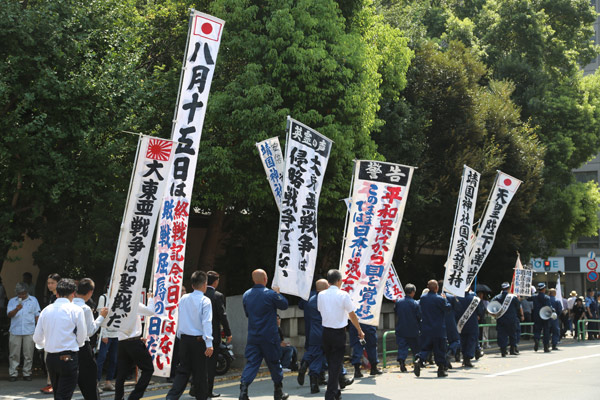Japan's military mindset resurrected
 |
|
Right-wing activists carry banners at the Yasukuni Shrine on Thursday, on the anniversary of Japan's surrender in World War II. Cai Hong / China Daily |
Ceremony hijacks history, drives political agenda
There is one place in Japan where the emperor dare not go. It is a supreme irony, because it is the place where he would be most welcomed and that his prime ministers and members of the cabinet often visit.
Neither distance nor geography is a factor. His imperial home is close by, and, on Aug 15, he will be just 600 meters from it, across the road at the Nihon Budokan hall in Tokyo, at the official ceremony marking the end of World War II.
But that small distance represents conflicting views of Japan's past and future.
The place he dare not go is the Yasukuni Shrine, a toxic mix of myth and militarism that acts like a canker gnawing the vitals of the Japanese body politic. Even the name is strangely at odds with its function. Yasukuni means peaceful nation in Japanese.
Emperors have visited in the past. Hirohito paid his respects at Yasukuni eight times after the war but made his final visit in 1975, three years before the souls of war criminals were enshrined.
Akihito has not visited Yasukuni since succeeding his father as emperor in 1989.
Every nation has a right to honor its war dead. The Tomb of the Unknown Soldier holds a special place in the hearts of people regardless of their nationalities. But this is not Yasukuni's role. There are no bodies in the shrine. There is, just 2 kilometers up the road, Chidorigafuchi National Cemetery, where the remains of World War II dead are buried. It has a Tomb of the Unknown Soldier.
The shrine's post-1945 association with wartime state Shinto, a fundamentalist version of the creed, was once considered a joke. A quixotic display of people dressed in funny uniforms who made the Flat Earth Society seem like visionaries. They had no place in modern camera-producing, car-making, salary-man Japan. Or so the story went.
But in 1978 the souls of 14 Class-A War Criminals (those who plan and conduct wars of aggression), seven of whom were hanged after the Tokyo trials, were enshrined.
This was an incredible victory for the militarists, but it had to be kept quiet, at least initially. The news was not publicized until 1979.
Because Yasukuni is privately funded, by the Association of Wartime Bereaved Families, the government was able to deny any official role. But in a country where one party, the Liberal Democratic Party, has been in power for all but four years of the past sixty, its powers of denial have been as audacious as they are breathtaking.
The shrine occupies prime real estate in the heart of Tokyo. Its manicured grass, elaborate 19th century architecture and multimillion dollar museum annex bear audacious testimony to the power of its patrons.
Its Book of Souls records the names, origins and places of deaths of approximately 2.5 million mostly Japanese men, and some women, who died in wars since the shrine was built in 1869.
State Shinto refers to them as "kami" (divine, godlike), as in kamikaze. The souls are worshipped as deities.
General Hideki Tojo, Japan's prime minister from 1941 to 1944, is one of the 14 inscribed in the Book of Souls, but the other 13 seem strangely in the shadows.
Tojo was tried in 1948 for war crimes on 54 counts, found guilty and hanged. Only afterwards was it revealed that he had approved anatomical experiments on prisoners without anesthetic. Another six were found guilty and hanged, four received life imprisonment, one got 20 years, and two died before sentencing.
General Iwane Matsui, commander-in-chief of the invading Japanese troops who committed the Nanjing Massacre in 1937, and his chief-of-staff, Akira Mutou, deserve special mention.
Both were executed on Dec 23, 1948, after being found guilty of perpetuating the massive slaughter of civilians.
They were far from contrite.
At least 300,000 Chinese were killed over the course of six weeks by Japanese invaders, who occupied Nanjing on Dec 13, 1937.
The horrendous extent of the rampage of Matsui's forces is still denied by many in Japan even today. Yasukuni is the ultimate symbol of those in denial and strengthens their determination to cover up.
- China, S Korea condemn Japan over war shrine visit
- Should Japanese politicians visit Yasukuni shrine?
- China summons Japanese ambassador over shrine visit
- Japan's Abe sends offering to war shrine
- Two Japanese ministers visit Yasukuni shrine
- Abe rules out visit to Yasukuni shrine
- Abe rules out visit to Yasukuni shrine



























